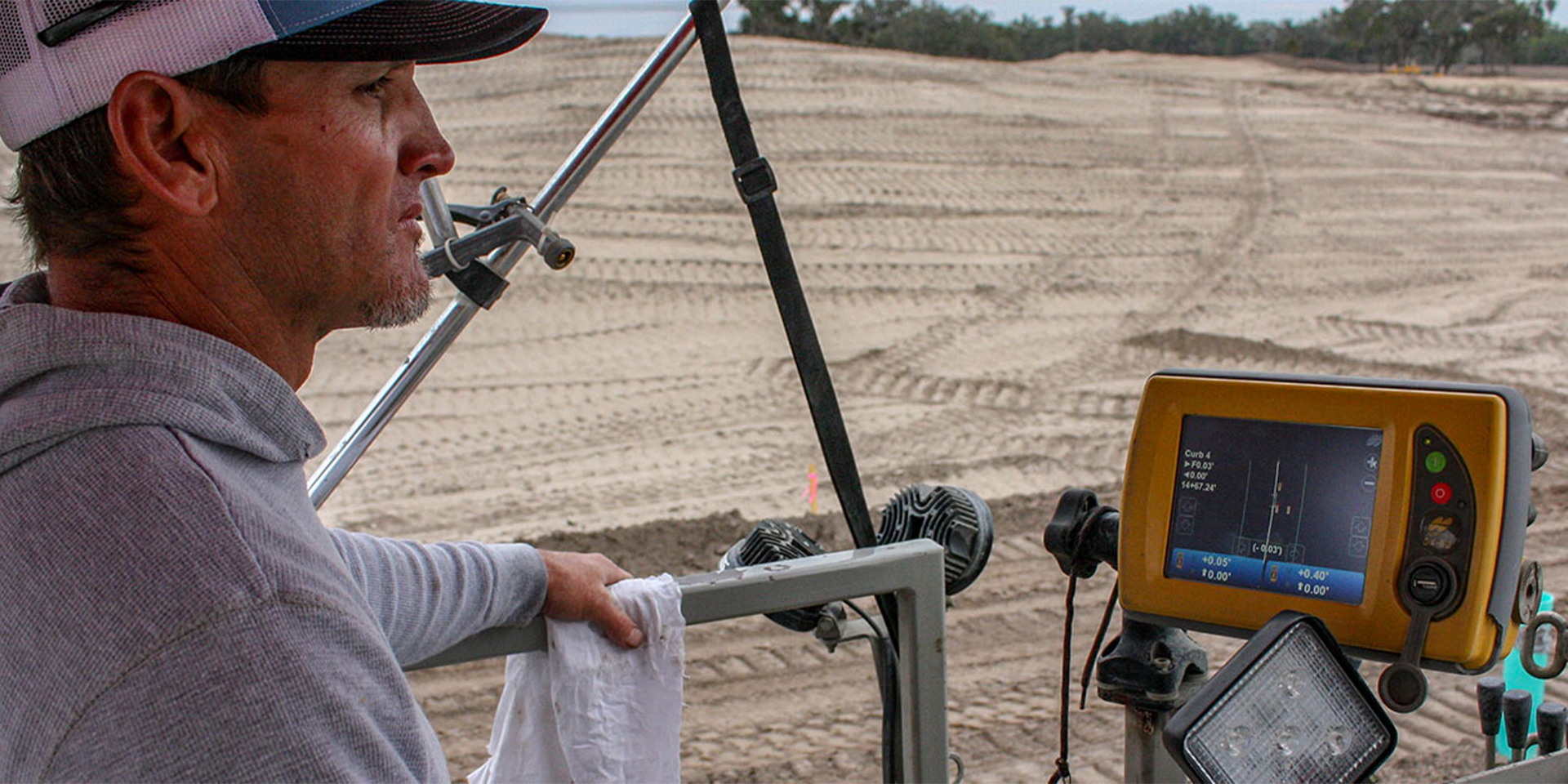
Lenard Powell has been building curb and gutter for better than two decades. In that time, he has poured more than 630 miles of curb — enough to stretch from his offices in central Florida, to Nashville, Tennessee. Until recently, the overwhelming majority of that work had been done using a tried-and-true technique: a stringline-based system. Accepting that all things change, however, and acknowledging that a stringless solution’s time had come, Powell and his company, Lenard Powell Inc. (LPI), made the move to a stringless, millimeter-grade GNSS solution. That move, he said, has resulted in a better product, less reliance on a survey crew, improved production rates and a smaller workforce. Though it’s only one machine in a larger fleet, they’ve begun cutting ties with older technology — in every sense of the word.
"I could have written the perfect country song in 1996..."
Lenard Powell
Almost Like a Song
Almost every professional working today has a story of what led them to their respective occupation. Often, it’s just being the next in line for succession; sometimes it’s finding a way to deal with career burn-out. Lenard Powell’s story is not as common — but it’s a whole lot more compelling.
“I could have written the perfect country song in 1996,” he said. “At that time, I was a farmer and there wasn’t much that went my way that year. A broker took me for a quarter million dollars, my house burned down, my wife left me, my favorite dog got killed by a poacher — it was an unbelievable string of events. But I truly believe everything happens for a reason and I soon found out what that was.”
Lamenting his situation to a fellow parent at a youth rodeo event at which his child was competing, Powell happened to mention that, much as he loved farming, he needed to find a new profession.

“The guy I was talking to, Ike Rainey, told me: ‘Well, I could use a curb man,’ Powell said. “I had no clue what a curb man was, so he explained that his company was trying to build up the road building part of its business and they needed someone to create curb and gutter for them. It interested me enough to ride around with him for a week, see how things were done and give it a shot. I copied a phone number off a Kurber5000 I saw in use elsewhere, called them and, using a portion of the insurance proceeds from the house fire, made a down payment on my first curb machine. I rode with Ike for a while to learn the business and I’m sure I pushed his patience to the limit, but we made it work. He’s retired now but I continue to work as a subcontractor to his company, Rainey Construction. Ironically, one of their biggest clients, The Villages, is planting new homes on the very land where I used to plant watermelons — and I’m doing curb for those roads.”
Lessons Learned
LPI’s growth was slow but steady and Powell soon had his company tackling a decent schedule of projects, running eight curb machines and employing more than 100 workers during peak season. Faced with the Great Recession in 2008, they downsized, and unlike many others, were able to survive.
“Business slowed for us, I won’t deny that,” said Powell. “But that downturn forced us to correct ourselves and get to a more manageable size. Since then, we’ve kept under 50 employees and it’s worked out well. The bulk of our work is done here in The Villages, Florida. This was the first piece of business I picked up when I got into the business and, though we’ve done DOT work and other projects throughout the area, The Villages is where you will generally find us. And I couldn’t be happier — both The Villages and Rainey have treated us great since day one.”
By way of an explanation for non-Floridians, The Villages — located between Orlando and Ocala in central Florida — is the planned community to end all planned communities. Offering a wealth of amenities, including recreation centers, softball fields, a polo stadium, as well as 12 championship-level and 38 executive golf courses, the community has thrived. In fact, between 2010 and 2017, The Villages was the fastest growing metropolitan area in the United States, growing an impressive 32.8 percent in that period.
"With the Topcon system on the Power Curber unit, we’ve eliminated the stringline crew entirely and cut the survey crew by about two-thirds."
Lenard Powell
Making Change
Even though LPI was moving along nicely with its fleet of existing curb machines, Powell was not oblivious to all the talk around him of the stringless solution that was revolutionizing curb and gutter work. He had, in fact, seen a system demonstrated in the past but was apprehensive about making a move at that time.
“I saw it several years ago at World of Concrete in Las Vegas and felt there was no way it could be as accurate as we needed, using just GPS,” he said. “But when Roger Croft from Lengemann, our Topcon dealer, showed me that Topcon had combined it with laser technology to bring it to millimeter grade, I decided it was time to give it a serious look. We added it last year on a Power Curber 5700C and are really impressed with what we are able to do now.”
The catalyst for turning LPI’s PowerCurber unit into a stringless curbing solution, is a Millimeter GPS Paving System from Topcon Positioning Systems (Livermore, Calif.). Millimeter GPS provides Powell’s crew with the benefits of GPS positioning technology, bolstered by a zone laser reference to improve the accuracy of the curb machine to the levels needed.
“When we pour curb, our design calls for a .5% slope — it cannot have any dips, it has to run,” he said. “That’s attainable with string but you need to have stakes every 25 feet with the offset and the grade on each, then literally get down on your hands and knees to eyeball it. Running the stringless system, we only have an occasional reference stake — the rest is all automatic. Putting all our faith in that system took some getting used to, but it’s proven itself on every job we’ve done with it and the benefits are substantial.”
Size Matters
Powell’s view of the term “benefits” differs from that of other similar contractors who tend to focus solely on a financial equation. In fact, when pressed for an estimated return on investment for the stringless solution, he chooses instead to offer an alternative way to frame his savings.
“The truth is, it’s getting tougher and tougher to find good workers,” he said. Pouring curb and gutter is hard, hot, nasty work, and here in Florida, summer days are generally 90-plus degrees with high humidity. Very few people — let alone new, younger workers — want to work outside in those conditions. So, for us, reducing the size of our labor force through the use of the Topcon stringless solution is much a bigger benefit than any straight financial payback.”
To illustrate just how that savings is realized, it’s best to look at the way in which LPI approaches its stringline-based jobs. For such projects, a survey crew must stake the entire job rather than just periodically. Survey is followed by a stringline crew and then the curb crew.
“With the Topcon system on the Power Curber unit, we’ve eliminated the stringline crew entirely and cut the survey crew by about two-thirds. If we weren’t so adamant about checks and balances, we could probably cut our dependence on survey even more. But we subscribe to the ‘measure twice cut once’ principle, and it’s served us well. So reducing crew size on certain projects by as many as four men is how we are seeing payback.”
Dealing With Hiccups
According to Powell, he and his crew are admittedly far from tech savvy, so the transition into the stringless solution was not without its bumps. While one particular issue was resolved by increasing the sensitivity in the curb machine’s slope leg to improve reaction times, gaining a basic familiarity with working in a GNSS environment was really at the root of it all.
“We were expecting some hiccups and we got some,” he said. “However, Roger Croft, Lengemann’s sales manager, is an amazing asset for us. He understands that we are concrete guys and that learning to run this new technology was a bit of a challenge at the outset. Despite being extremely busy, he’s been here whenever we’ve needed him and always takes our calls — in many cases helping us solve an issue over the phone. He genuinely knows the technology and backs up the sale. Power Curber has also been great. They have a tech in Webster, Florida who helped us through problems that have come up — everyone has been very responsive.”
Millimeter GPS has definitely found a home with LPI. Since making the move more, than 75% of the company’s curb work is now done without string, many of those eight curbing units have been reconfigured for other work, and production rates have been averaging about 4,000 feet per day. While those rates were attainable with the old system, getting there would have taken all the additional manpower described earlier. The overall process now has been so streamlined and efficient, that working on projects outside of The Villages, draws some strange comments.
“When we pour elsewhere and tell them we want to pour curb and gutter at 9:00, we need 200+ yards of concrete, and we need trucks delivering mud at 20-minute intervals, they literally laugh,” he said. “They are thinking we can’t possibly need it that quickly — but we do. The new stringless system has us just humming along. It took us a bit to get into a groove, but we are definitely in one right now. On most projects here in The Villages, the contractor has eight or ten pipe crews working and they still can’t outrun us. We made the right move.”
















